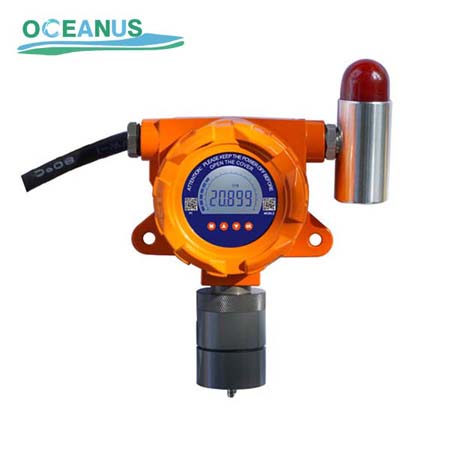Knowing A Gas : Chlorine
Chlorine is a simple substance formed by the element chlorine, with the chemical formula Cl2. Under normal temperature and pressure, it is a yellowish green highly toxic gas with a strong pungent odor, which is asphyxiating and has a higher density than air. It is soluble in water and alkali solutions, easily soluble in organic solvents (such as carbon tetrachloride), and difficult to dissolve in saturated salt water. Easily compressed, can be liquefied into yellow-green oily liquid chlorine.
When hydrogen gas with a volume fraction of more than 5% is mixed in chlorine gas, there may be a risk of explosion when exposed to strong light. Chlorine is toxic and mainly invades the human body through the respiratory tract and dissolves in the water contained in the mucosa, causing damage to the upper respiratory tract mucosa. Chlorine is one of the main products in the chlor-alkali industry. It can undergo substitution and addition reactions with organic and inorganic substances to generate a variety of chlorides, and can also be used as a strong oxidant. Mainly used in the production of plastics (such as PVC), synthetic fibers, dyes, pesticides, disinfectants, bleaches, and various chlorides.
Discovery of chlorine gas
After preparing chlorine gas, Scheler dissolved it in water and found that this aqueous solution had a permanent bleaching effect on paper, vegetables, and flowers; He also found that chlorine can react chemically with metals or metal oxides. From the discovery of chlorine by Scheler in 1774 to 1810, many scientists successively studied the properties of this gas. During this period, chlorine gas has been treated as a compound. It was not until 1810, after extensive experimental research, that David confirmed that this gas was composed of a chemical element. He named this element chlorine, which comes from the Greek language and means "green".
Application area
Chemical industry
The chemical industry is used to produce inorganic chemical products such as sodium hypochlorite, aluminum chloride, iron trichloride, bleaching powder, bromine, phosphorus trichloride, and other inorganic chemical products. It is also used to produce organic chlorides such as chloroacetic acid, epichlorohydrin, and monochlorobenzene. It is also used in the production of neoprene, plastics, and plasticizers. The daily chemical industry is used to produce raw materials such as sodium alkyl sulfonate and sodium alkyl benzene sulfonate for synthetic detergents.
Electronics industry
In the electronic industry, high-purity chlorine gas is mainly used for dry etching, optical fiber, crystal growth, and thermal oxidation in the electronic industry.
Pharmaceutical industry
Chlorine is commonly used in pharmaceuticals and is often involved in the synthesis of chlorinated organic compounds.
Pesticide industry
Used as a raw material for the production of highly effective insecticides, fungicides, herbicides, and plant growth stimulants.
Wastewater treatment for breweries
A Chinese patent discloses a method for treating brewery wastewater using chlorine gas. Chlorine is a widely used disinfectant in water companies due to its low price, low consumption, reliable disinfection, and mature technology. Chlorine can also deodorize and remove microorganisms, and has a high removal rate for biological and chemical oxygen consumption, ensuring the stability of the recovered water quality, making it more suitable for the treatment of brewery wastewater.
Tap water disinfection
Tap water is commonly disinfected with chlorine gas. 0.002 g of chlorine gas is injected into 1 L of water. The principle of disinfection is that it reacts with water to generate hypochloric acid, which has a strong oxidizing property to kill bacteria in the water. The reason why hypochloric acid is not directly used for disinfection of tap water is that hypochloric acid is easy to decompose, difficult to preserve, costly, and highly toxic. Using chlorine gas for disinfection can achieve a balance in the dissolution, decomposition, and synthesis of hypochloric acid in water, with a suitable concentration and less residual toxicity in water.
Hazards to human body
Chlorine is a toxic gas that mainly invades the human body through the respiratory tract and dissolves in the water contained in the mucosa, generating hypochloric acid and hydrochloric acid, causing damage to the upper respiratory tract mucosa: hypochloric acid causes strong oxidation of tissues; Hydrochloric acid stimulates inflammatory swelling of the mucous membrane, causing edema of the respiratory tract mucosa, and a large amount of mucus secretion, causing difficulty in breathing. Therefore, the obvious symptom of chlorine poisoning is a severe cough. When symptoms are severe, pulmonary edema can occur, making circulation difficult and leading to death. Chlorine entering the human body through the esophagus can cause nausea, vomiting, chest pain, and diarrhea. The maximum allowable chlorine content in 1L of air is 0.001 mg, which can cause human poisoning.
Hazard prevention
Defective equipment and components cannot be selected, and each equipment and component should be regularly tested and inspected.
Strengthen process management, strictly control process indicators, and promptly inspect and handle problems found.
Strengthen the management and maintenance of accident chlorine treatment devices, use multiple power supplies for relevant devices, regularly clean the accident chlorine treatment device, and regularly test run the pumps.
In order to detect chlorine leakage in a timely manner, chlorine alarms should be installed in production, storage, transportation, and use posts. Once chlorine leakage occurs, it can be detected as soon as possible to prevent the expansion of the accident, and television monitoring and alkali spray devices should be installed in liquefaction posts.
Strengthen safety education and training for employees.
Because chlorine gas is a highly toxic gas, it can cause great harm to human body after leakage. Therefore, in order to ensure the safety of production operations, fixed online chlorine detectors will be installed in production situations where chlorine #gas is used for processing. The fixed online gas detector can achieve real-time wireless data transmission to the computer network through an external alarm controller, achieving real-time monitoring of the chlorine concentration at the production site, thereby ensuring the #safety of production line operations.
more product details:
Whatsapp: +8615981942832
Email: info@china-oceanus.com
- Pre:Automobile Exhaust 2023/3/30
- Next:New portable gas detector with inner pump 2016/4/11





